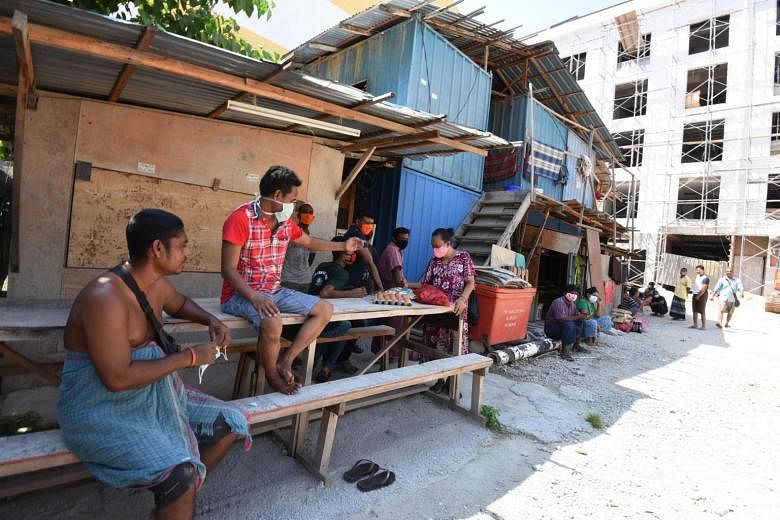Ayesha (not her real name), a 35-year-old woman in Bangladesh's Narayanganj district, spends most of her time praying these days. It is what keeps her hopeful during this difficult period.
Her husband is an undocumented worker in Malaysia's construction industry and has been sick often in recent months. A Covid-19 test, thankfully, turned out to be negative last week.
He would send his family around 20,000 Bangladeshi taka (S$330) every month but his frequent bouts of illness - leaving him unable to work - and a movement control order by Malaysia since March 18 meant he has not been able to send money home for four months.
Moreover, with a greater possibility of institutional medical care, he is now also more vulnerable to being arrested by the local authorities.
"He has not been able to eat well and has been worrying himself even more sick about his condition and us," Ms Ayesha told The Straits Times on the phone.
The family of seven, meanwhile, has to scrape by on earnings of 4,000 Bangladeshi taka every month from her 18-year-old son, who helps one of his relatives run a fish business. "Allah is keeping us alive somehow," Ms Ayesha added.
Families like hers in Bangladesh, a country with more than 10 million blue-collar workers abroad, have been acutely hit by the Covid-19 downturn. While Bangladeshi workers sent back more than $25.47 billion last year, their remittance has shrunk in recent months, leaving families dependent on them in an uncertain situation.
The Ovibashi Karmi Unnayan Programme (OKUP), a community-based migrants' organisation in Dhaka, has received around 1,600 distress calls from families of migrant workers abroad via its helpline since March 20, and the calls keep pouring in. Most of these calls are from families who are facing severe food shortage because their husbands or sons have not been able to send money back home," OKUP's chairman Shakirul Islam told The Straits Times.
"An additional problem is that these families have had a relatively elevated social status that has made them ashamed to ask for help as well as unlikely to receive government assistance when they do because they do not fall into the category of low-income people," he added.
According to local media reports, the Bangladeshi government has announced a range of support measures for migrant workers, including a 2 billion Bangladeshi taka fund to support workers who are forced to return home as well as 80 million Bangladeshi taka for its missions abroad to feed migrants in areas under their jurisdictions.
-
10m
-
Number of Bangladeshis who are blue-collar workers abroad.
It has also announced that workers, including those who are undocumented, will be eligible for a 300,000 Bangladeshi taka compensation if they die because of Covid-19.
But these measures have been described as insufficient, with calls for greater funding for distressed migrants and their family members as well as the creation of alternative employment for those who return and special measures to prevent them from being exploited by human traffickers.
With her husband currently in Singapore, Ms Nasim Akhtar and her family of four in Bangladesh's Munishiganj district are also among those affected. While her husband Juwel, who works as an escalator mechanic, was paid his minimum salary last month, he was unable to send money home because of the ongoing circuit breaker.
The worker lives in a rented house with others and has to pay his share of the rent as well as food. He said he will have to hold on to much of his salary because of the uncertain times ahead and may be able to send back only around $200 - about a third of what he usually remitted - when the circuit breaker ends.
"We are getting by somehow, managing three meals a day," Ms Akhtar told The Straits Times.
"We were used to a certain amount every month but now we are in a difficult situation. People don't believe me when I say we are struggling," she said.
Back in Singapore, Juwel said he hopes he will be paid his minimum salary for the circuit breaker period so that he can continue supporting his family. "I keep reassuring my family that things will be fine soon," he added.











